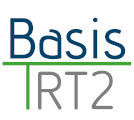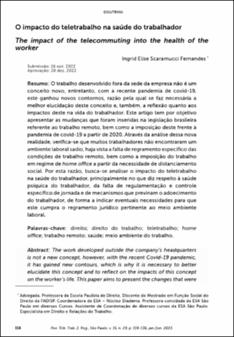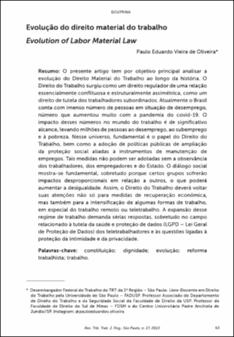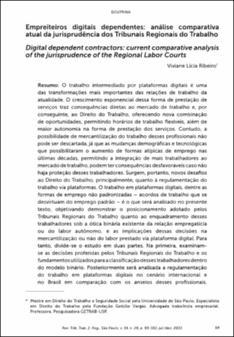Artigo de periódico
Assédio moral no novo contexto laboral do teletrabalho
| dc.contributor | Ribeiro, Viviane Lícia | |
| dc.contributor.author | RIBEIRO, Viviane Lícia | |
| dc.date.accessioned | 2025-04-08T18:01:57Z | |
| dc.date.available | 2025-04-08T18:01:57Z | |
| dc.date.issued | 2025-05-28 | |
| dc.identifier.citation | RIBEIRO, Viviane Lícia. Assédio moral no novo contexto laboral do teletrabalho = Bullying in the new working context of teleworking. Revista do Tribunal do Trabalho da 2ª Região, São Paulo, v. 17, n. 33, p. 112-122, jan./jun. 2025. | pt_BR |
| dc.identifier.uri | https://basis.trt2.jus.br/handle/123456789/17228 | |
| dc.description.abstract | [por] Este artigo analisa o assédio moral no teletrabalho, sob o enfoque das decisões do Tribunal Superior do Trabalho (TST) após o advento da Reforma Trabalhista e o aumento do trabalho remoto em decorrência da pandemia de covid-19 e o incremento da inteligência artificial. O estudo investiga como as práticas abusivas no ambiente virtual, como o controle digital excessivo, a cobrança após a jornada de trabalho e o isolamento social, impactam não apenas os trabalhadores, mas, principalmente, a questão probatória para o ressarcimento de eventuais danos causados aos trabalhadores. Chega-se à conclusão de que o entendimento do Tribunal Superior do Trabalho precisa se adaptar às novas dinâmicas do teletrabalho na busca de proteção aos direitos fundamentais dos trabalhadores. A lacuna existente na legislação atual torna premente o surgimento de regulamentação específica para o controle digital no teletrabalho. Verifica-se, portanto, que apesar dos avanços jurisprudenciais, a definição de limites claros para o teletrabalho é crucial para evitar abusos e garantir a dignidade dos trabalhadores. | pt_BR |
| dc.description.abstract | [eng] This article analyzes moral harassment in teleworking, focusing on the decisions of the Superior Labor Court (TST) after the advent of the Labor Reform and the increase in remote work due to the COVID-19 pandemic and the increase in artificial intelligence. The study investigates how abusive practices in the virtual environment, such as excessive digital control, charging after working hours and social isolation, impact not only on workers, but mainly on the issue of evidence for compensation for any damage caused to workers. The conclusion is that the Superior Labor Court's understanding needs to adapt to the new dynamics of teleworking in order to protect workers' fundamental rights. The gap in the current legislation makes it urgent to create specific regulations for digital control in teleworking. It can therefore be seen that, despite advances in jurisprudence, the definition of clear limits for teleworking is crucial in order to avoid abuses and guarantee workers' dignity. | |
| dc.description.tableofcontents | Introdução -- Teletrabalho e a reforma trabalhista -- Assédio virtual. Teleassédio moral. Assédio eletrônico -- Entendimento dos Tribunais Trabalhistas pátrios e responsabilização do empregador -- Conclusão | |
| dc.language.iso | pt_BR | pt_BR |
| dc.relation.ispartof | Revista do Tribunal do Trabalho da 2ª Região: v. 17, n. 33 (jan./jun. 2025) | |
| dc.subject | Assédio moral | pt_BR |
| dc.subject | Comunicação digital | |
| dc.subject | Decisão judicial | |
| dc.subject | Reforma trabalhista | |
| dc.subject | Teletrabalho | |
| dc.subject | Tribunal do trabalho | |
| dc.subject | Tribunal superior | |
| dc.title | Assédio moral no novo contexto laboral do teletrabalho | pt_BR |
| dc.title.alternative | Bullying in the new working context of teleworking | pt_BR |
| dc.type.genre | Artigo de periódico | pt_BR |
| dc.type.material | Documento textual | pt_BR |
| dc.relation.ispartoflink | https://basis.trt2.jus.br/handle/123456789/17220 |
Coleção
-
Artigos de Periódicos132
Artigos de Periódicos








